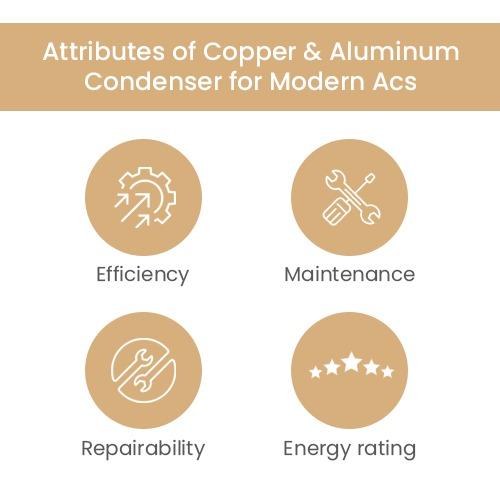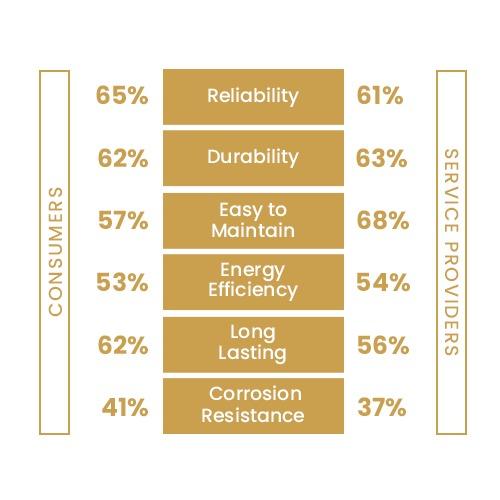Copper AC – Beyond Breakdowns and Bills
The kind of summer that hits our country now is scorching and unbearable, to say the least. With mercury soaring to higher and higher scores, its impossible to stay without an Air Conditioner (AC) or a room cooler. Also, as humidity soars with the onset of monsoon, even coolers begin to fail, and it is only an AC that gives some respite. However, there are three major cost related to ACs viz, initial purchase cost, energy cost and maintenance cost. A wrong choice by the consumer while buying an AC, can have severe impact on the energy cost and the maintenance cost. During the initial and peak spread days of the novel coronavirus (COVID-19) in 2020, the AC breakdown was looked as the most dreaded nightmare. As living rooms, bedrooms, and study rooms transformed into office chambers and cubicles for several professionals, the ACs ran for a greater number of hours. Non-availability of service technicians due to lockdown, resulted in irregular checkups and maintenance sessions leading to largescale breakdowns. As per a survey done by ICA India, the highest number of failures were seen in aluminum or aluminum alloys ACs whereas copper ACs gave minimal trouble.
While adhering to regular AC tune-up services to avoid breakdowns becomes a preventive measure to avoid unwanted breakdowns, the cure lies in buying a cooling appliance which is reliable, durable and easy to maintain. In their efforts of buying a new AC, most people usually look for cooling capacity, energy efficiency ratings, filters and several other features. However, one feature that mostly goes unnoticed is the type of heat exchanger the AC has. If you are not aware, then it is important to know that modern ACs feature two different types of heat exchangers – copper, and aluminum or Alloy.
The survey asked consumer, service providers and retailers on how they associate copper in ACs. The findings where interesting:
As per consumers:
- 65 percent respondents associated copper with reliability,
- followed by 62 percent for durability,
- 57 percent in aspect of easy to maintain,
- another 53 percent for energy efficiency,
- 62 percent for longevity,
- and 41 percent for its quality to resist corrosion
As per service providers:
- 61 percent associated copper with reliability,
- followed by 63 percent for durability,
- 68 percent in aspect of easy to maintain,
- 54 percent for energy efficiency,
- 56 percent for longevity,
- and 37 percent for its quality to resist corrosion.


We have provided a brief comparison of copper vs aluminum used in ACs across various performance parameters:
Copper vs Aluminum heat exchanger: Durability
Oxidation is a common process in ACs as the heat exchangers always in contact with air which results in corrosion. While, both copper and aluminum heat exchangers are prone to corrosion which compromises their cooling capacity. In copper, corrosion occurs, but at a relatively slower rate compared to aluminum. Aluminum is more reactive to air and also corrodes faster.
Copper vs Aluminum heat exchanger: Efficiency
Copper has one major advantage over aluminum is its low specific heat. Copper can heat up and cools faster than aluminum. In real world usage, copper ACs can offer consistent cooling compared to aluminum.
Copper vs Aluminum heat exchanger: Maintenance
Maintaining copper heat exchangers is relatively easier compared to aluminum heat exchangers. In fact, copper heat exchangers are also much stronger than aluminum, thanks to the high tensile strength of the metal. Aluminum ACs, on the other hand, are hard to maintain and are also prone to get easily damaged. It can be a nightmare for those living in harsh weather conditions.
Copper vs Aluminum heat exchanger: Repairability
Just like maintenance, the copper heat exchangers can be easily repaired on-site. While, with aluminum heat exchangers, mostly the solution is replacement, which takes more time and more money.
Copper vs Aluminum heat exchanger: Energy rating
Long term energy rating is also among a factor to consider while choosing heat exchangers. Copper heat exchangers are more durable and are generally more energy efficient than aluminum heat exchangers. Keeping all other parameters same, if you compare energy rating of copper AC with Aluminum AC, it is found that a 5-star rating for aluminum heat exchanger AC will drop to around 1-2 star in just 2-3 years, while the copper heat exchanger ACs will drop to 4-3-star in the same time frame. Due to its design copper heat exchangers are easy to clean and maintain thus providing energy efficiency as per its Star rating for many years. On the other hand, dirt gets accumulated on Aluminum heat exchangers which cannot be cleaning easily. This impacts the heat transfer coefficient and thus reducing the energy efficiency to below its initial Star Labelling resulting in higher energy bills


